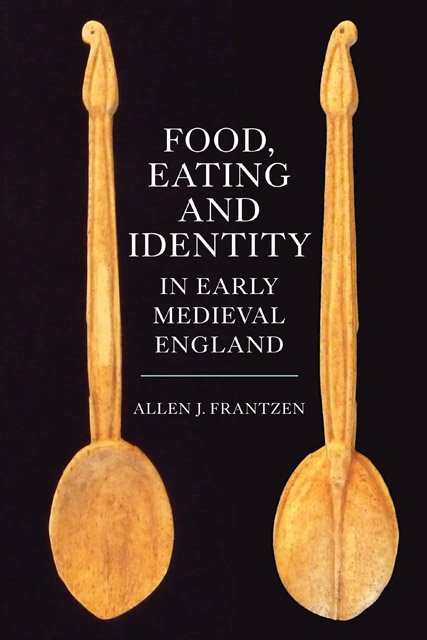1 - The Symbolic World of Food
Published online by Cambridge University Press: 14 February 2023
Summary
Remembering things
Many more objects than words survive from Anglo-Saxon England. The objects reveal more sides of lived experience than do words and texts, but the objects are more difficult to study, or even to see. Some of them, especially those found in the millions, including pottery fragments, coins, nails, broken stones, and bones, have never been photographed. Those that have been photographed are difficult to reproduce if money is an object. In contrast, Anglo-Saxon texts have been cheaply available in editions and translations for decades and can be accessed in electronic form as editions or digital facsimiles, often at no charge. There are good reasons for these disparities, since material culture is expensive to curate and reproduce; words, once printed, are not. One unfortunate consequence is that texts dominate scholarly understanding of the Anglo-Saxon world, while objects – with the exceptions of treasure troves, a few swords and helmets, and, of course, manuscripts – remain in the background. My focus in this chapter is the relationship between words and things as texts present it and as recent theory in archaeology helps us reconceptualize it.
Anyone who wants to explore the connections between words and things must connect both media to lived experience, a process that brings a further consequence of textual dominance. Powerful but unwritten rules determined what would be written about and what would be passed over. Most texts do not describe or discuss ordinary things, and the more extraordinary the text – Beowulf, for example, or Wulfstan’s Sermon of the Wolf to the English – the less likely it is to refer to daily life in any but hyperbolic terms. Ordinary things, including the ordinary things of Anglo-Saxon daily life, might find a wider scholarly audience if they could be accessed more readily. Peter Shillingsburg has called for “knowledge sites,” archives of electronic resources rich in both texts and images, to bring us closer to ancient worlds and remote times by telling us about “the things that went without saying.” Shillingsburg’s phrase, “the things that went without saying,” might well include the ordinary objects of Anglo-Saxon England. The phrase describes information available to authors but not to their readers, the kind of information that authors benefited from but did not pass on because they did not anticipate that it would be lost.
- Type
- Chapter
- Information
- Food, Eating and Identity in Early Medieval England , pp. 9 - 33Publisher: Boydell & BrewerPrint publication year: 2014

